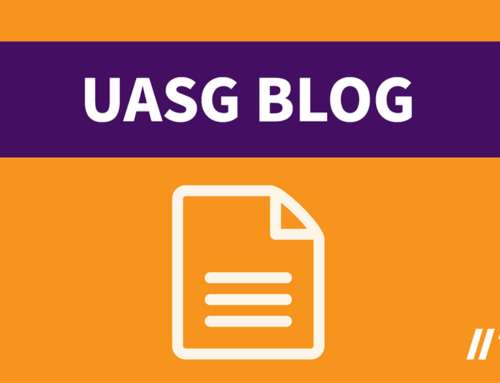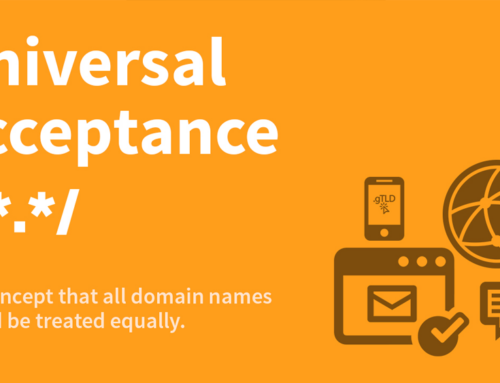By the UASG Communications Working Group
Imagine trying to complete a transaction online — signing up for a class, ordering food delivery or subscribing to your favorite newsletter. If you only use letters used in the English language and have an email address using a domain name ending in .com, .org, .edu or .net, or others available for many years, it’s likely a seamless process.
But if your email address ends in .世界 or @डाटामेल.भारत or .photography, or other new top-level domain (TLD), you might get an error message and will be unable to complete your transaction. This happens when online systems aren’t Universal Acceptance (UA)-ready.
UA is a technical requirement that ensures all domain names and email addresses can be used by all Internet-enabled applications, devices and systems. Understanding UA starts by acknowledging that the Domain Name System (DNS) has changed significantly over the last decade in regard to the overall number of TLDs, scripts and languages used for TLDs, and their character length. There are now more than 1,200 active gTLDs, as well as country code top-level domains (ccTLDs) that are available in different scripts and that may be longer than three characters. These new TLDs provide greater consumer choice and can represent cultures, brands, geographies, special interests, and more (e.g., .ไทย, .LONDON, .SPORT).
But even while the DNS has changed, the checks used by many software applications to validate domain names and email addresses are from decades ago. Many systems don’t recognize or appropriately process new domain names, and not all online portals are primed for the opening of a user account with one of these new email addresses. That’s why awareness of and support for UA is critical for a truly global, multilingual Internet. Organizations and stakeholders that take steps to ensure their systems are UA-ready enjoy a host of benefits, including:
- Enabling digital inclusivity. Many people around the world are currently excluded from experiencing the full benefits of the Internet simply because they’re unable to use a domain name or email address in their language and script of choice. The majority of the world doesn’t speak English as a first language or use American Standard Code for Information Interchange (ASCII) characters. In fact, only more than a thirdof the world population uses the Latin alphabet in English, while there are billions of people who prefer to read and write in Arabic, Chinese, Cyrillic, Devanagari or other scripts.
Today, the Internet population is 4.5 billion active users, and at least one billion more are expected to come online by 2023. Achieving Universal Acceptance (UA) for all domain names and email addresses is crucial to enabling consumer choice online and achieving digital inclusivity for all of these users.
Read more about the social relevance of UA here.
- Providing business opportunities. Many businesses are leaving money on the table by not updating their systems to be UA-ready, which has the potential to unlock billions in revenue from untapped customers. A 2017 UASG study found that the Universal Acceptance of Internet domain names is, conservatively, a $9.8+ billion USD opportunity. Businesses that are UA-ready are best positioned to reach growing global audiences and maximize revenue potential from the current Internet population, as well as the next billion.
As more Internet users come online from around the world, there will be increased demand for businesses that can support domain names and email addresses in a language and script of their choice. Businesses that support customers in this way will have a first-mover advantage and the potential to capture new revenue streams.
Read more about the business opportunities of UA here.
- Delivering career growth. A strong understanding of Universal Acceptance (UA) is the new competitive differentiator for every software developer. Not only is it the cornerstone of a more inclusive and multilingual Internet, but it also essential for developers who want to be at the forefront of their industry and keep pace with the rapidly evolving DNS.
Technology developers and systems administrators have the opportunity to enable worldwide users to experience the social and economic power of the Internet by updating legacy systems and ensuring every new system is built to accept all domain names and email addresses. Developers who become UA experts can set themselves apart with a valuable skill and advise new/current employers on how to capitalize on the social and economic benefits of becoming UA-ready. Additionally, developers who understand UA principles have a unique advantage in designing more inclusive systems, which presents a strong opportunity for business growth – especially for global organizations.
Read more about the career opportunities of UA here.
While UA might sound complex, implementing it is not, and the efforts involved are outweighed by the benefits of doing so. Also, organizations that want to become UA-ready don’t have to do it alone. The Universal Acceptance Steering Group (UASG) exists to help educate and provide resources to organizations looking ensure their systems are UA-ready and able to accept all domain names and email addresses in any valid script.
The UASG has developed a number of helpful guides and resources, which are available at https://uasg.tech/document-hub/.





